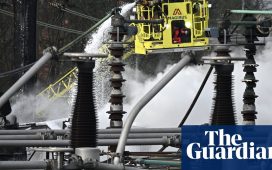Britain’s new Labour government believes that its pivot towards green industries — and the chance of five years of political stability after its landslide election victory in July — will attract more low-carbon investment.
But investors at home and abroad remain unsure whether to push more money into the UK because of concerns about the country’s sclerotic planning system, supply chain problems and skills shortages.
For many, the question is whether Labour’s offering can possibly match the huge subsidies on offer in the US through the Inflation Reduction Act.
Signed into law in 2022, President Joe Biden’s flagship industrial policy offered almost $370bn worth of tax breaks, grants and loans to fuel cleantech sectors.
Charles Cherington, co-founder of private equity group Ara Partners, which is based in Houston, Texas and has several investments in the UK, said “policy rollbacks” under the last Conservative administration had left investors feeling uncertain.
“We expect this Labour government to be more positive on climate. So, from a spiritual standpoint, it is a better government to work with, but the devil will be in the policy and regulatory details, which are critical to rapidly deploying renewables and low carbon alternatives,” he said.
Chancellor Rachel Reeves and energy secretary Ed Miliband have argued that by pledging extra investment and subsidies — and ripping up planning laws — they can accelerate investment in renewable energy and low-carbon manufacturing.

Labour has put emerging green industries at the heart of its “mission for government”, relying on them to spur economic growth as well as tackle climate change.
The party’s election manifesto included a stretching pledge to cut emissions from electricity generation to net zero by 2030 — compared with 2035 under the previous government — en route to a broader economy-wide target of net zero by 2050.
Labour ministers believe that their big majority in the House of Commons gives Britain more political certainty in the near term than other western democracies such as France, Germany and the US — where Donald Trump and Kamala Harris are neck-and-neck in the presidential race.
Trump’s vow to “terminate” the IRA if he returns to the White House has caused some investors to delay or pause projects, and British officials believe the UK may be able to capitalise on the growing uncertainty over the US policy.
“We are having very different conversations to the ones we were having three years ago,” said one senior UK government figure.
“Back then they were saying: ‘By the time you’re in power it’ll be too late to invest.’ But now they’re saying: ‘This is one of the most stable jurisdictions in the world to invest.’”
Some industry leaders share that view. Ana Musat, director for policy and engagement at trade association RenewableUK, said the investment environment was looking “much better” in the weeks since Labour took office.
“I think it’s pretty clear that Britain is open for business . . . people are excited and there’s optimism,” she added.
The renewable energy industry has welcomed the government’s rapid moves to end the de facto ban on onshore wind in England and increase the size of this year’s subsidy auction round for low-carbon energy.
A less generous auction last year was shunned by offshore wind developers, damaging the UK’s reputation as a global leader.
James Alexander, chief executive of the UK Sustainable Investment and Finance Association, whose 320 members oversee £19tn in assets, said investors were feeling more positive about the UK and “taking a closer look at what [it] has to offer” for the first time in years.
The last Tory government “eroded” investor confidence, driven by a rollback on key targets and “talking down the UK’s transition”, he said.
Last September, then prime minister Rishi Sunak pushed back several green measures including delaying the planned ban on sales of new petrol and diesel cars from 2030 to 2035. Labour has said it will reinstate the 2030 target.
Reeves and Miliband have also announced GB Energy, a new £8bn state-owned energy company aimed at accelerating the rollout of clean power, alongside a £7.3bn National Wealth Fund to back the shift to low-carbon manufacturing.
But the policies are a big downgrade on a “Green Prosperity Plan” that Labour watered down in the run-up to the election. As originally drawn up, the plan would have seen the government allot £28bn of debt funded spending to the low-carbon economy a year.
Stephen Phipson, head of Make UK, the manufacturing trade body, said he was having lots of conversations with “big corporate investors” exploring the UK.
While they had been encouraged by Britain exiting “a very, very difficult time . . and now it looks like we’re entering a period of political stability”, he warned that skills shortages, supply chain gaps and waits of up to 12 years to connect renewables projects to the electricity grid were a risk factor.
“All the big names are saying they have billions to invest, no doubt, but they’re not doing it until there’s a clear plan,” Phipson added.
Adam Berman, deputy director of advocacy at trade group Energy UK, said Labour’s early interventions had been “really promising” with a message that “resonates with investors” but “hard decisions” remained.
“If we are going to hit the clean power 2030 target, we are going to need to get moving; on the grid we heard lots of positive noises but we have yet to see the changes,” he said.
“If the UK is willing to take the bull by the horns, particularly on planning and the grid, there is every reason to believe we could reshore some of that investment.”
Reeves is targeting deep-pocketed North American investors to provide some of the private finance required to fuel green growth.
On a visit to New York and Toronto last month, she told Wall Street figures including Blackstone chief executive Stephen Schwarzman and Citigroup boss Jane Fraser that “Britain is open for business”.
One US clean tech investor who attended a meeting with Reeves in New York said her impressive presentation did not mask the steep challenges in making UK projects cost-competitive because of permitting delays and inadequate incentive structures.
“The UK has a clear need for battery storage investment due to challenges posed by intermittency due to the large amount of offshore wind in the energy mix but there is no cost-effective way for us to invest,” the investor said.
Britain faces stiff competition from the US and China to establish itself as a clean tech superpower. Many of the world’s largest investors are already tapping Biden’s IRA subsidies.
Last year investors funnelled $284bn into the manufacture and employment of clean energy, clean vehicles, building electrification and carbon management technology in the US, up more than one-third on 2022, according to research provider Rhodium Group and the Massachusetts Institute of Technology.
The scale of the US incentives on offer has alarmed UK and EU politicians, who worry it is spurring a global subsidy war that could divert investment.
But FT analysis last month found that 40 per cent of the biggest manufacturing investments announced in the first year of the policy had been delayed or paused.










